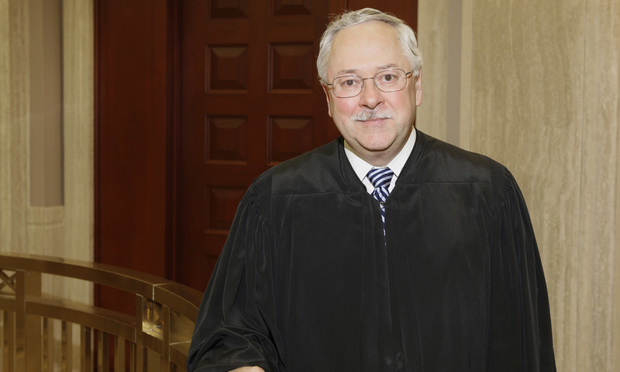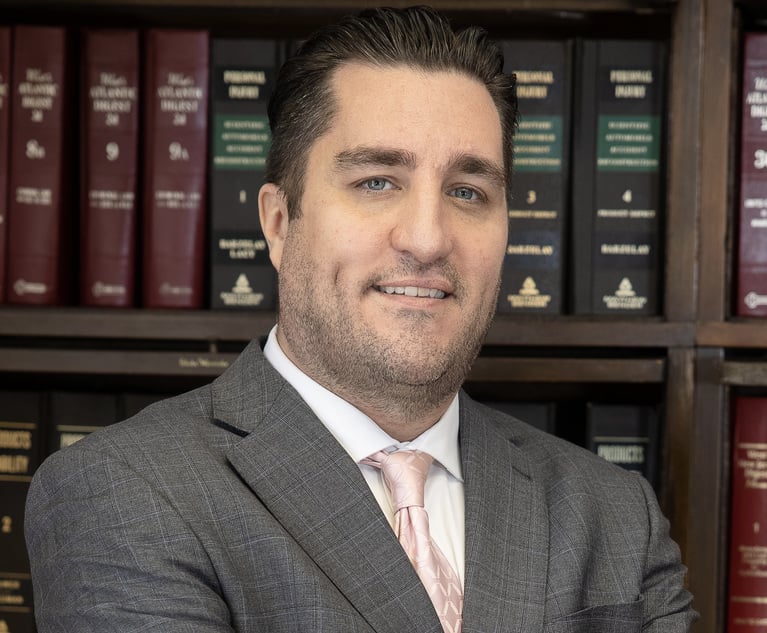'Extreme Carelessness' Prompts Lawyer Sanctions in Jail Suicide Suit
U.S. District Judge Jerome Simandle ordered Conrad Benedetto to pay certain legal expenses for defendant CFG Health Systems, which was under contract to provide medical care to prisoners.
March 30, 2018 at 04:57 PM
5 minute read

A federal judge in Camden has imposed sanctions on an attorney for “extreme carelessness” in taking on a case from another lawyer.
U.S. District Judge Jerome Simandle ordered Conrad Benedetto on March 29 to pay certain legal expenses for defendant CFG Health Systems, with the amount yet to be determined. CFG was under contract to provide medical care to prisoners. The company claimed Benedetto was barred from impleading it in a suit he filed in connection with an inmate suicide at the Cumberland County Jail, since claims against the company were dismissed by voluntary stipulation in a previous suit related to the man's suicide.
Simandle said sanctions against Benedetto were warranted because he was careless and, at worst, lacked candor in his dealings with the court in the case, Estate of Hennis v. Balicki.
The case stemmed from the 2014 death of David Hennis, who was found hanging in a cell at the jail infirmary. His mother, Patricia Hennis, first retained Adam Starr of Jarve Kaplan Granato in Marlton, who filed a suit against the jail, the warden, CFG Health and others on June 28, 2016. She then retained Benedetto, who filed a second suit on July 12, 2016. On Aug. 2, 2016, a stipulation of dismissal, signed by Starr, was granted in the first case. Hennis later asserted that she did not authorize the dismissal of the case, according to the decision.
Benedetto's suit did not name CFG Health as a defendant, but in December 2016, long after the July 2016 statute of limitations had run out, he sought leave to add the company as a defendant. U.S. Magistrate Judge Anne Marie Donio granted the unopposed motion, but then CFG Health was not served with the amended complaint until June 8, 2017, which was 148 days after it was filed, and beyond the 90-day requirement in court rules. At that point, CFG Health moved to dismiss the complaint and to sanction Benedetto. In response, Benedetto filed a motion to vacate the voluntary dismissal of the first case and consolidate it with the second, the decision said.
The first case was ordered reopened and reassigned to Simandle. When Starr, the plaintiff's previous lawyer, was alerted that that case was reopened, he wrote to Simandle saying that, shortly after he filed the first case, Benedetto sent him a letter stating that Benedetto's firm was taking over the case, at the request of Hennis. Simandle then issued an order to show cause, directing Benedetto to explain the contents of the Starr letter, which was contrary to Benedetto's own assertions in court. Benedetto replied that he had no communications with Starr before the first case was dismissed, according to the decision.
But Benedetto “apparently undertook no research of his own office file, his former associate, his clerical staff, or his personal email account before making these statements to this Court,” Simandle wrote March 29.
Only weeks before the decision—March 9—Starr sent the court a second letter, attaching emails he exchanged with Benedetto's personal email account. In this exchange, Starr said he never received a discharge letter from Hennis, and Benedetto wrote back to demand he forward a substitution of attorney or withdraw his complaint, according to the decision. Benedetto replied that he did not send those emails: the address those messages were sent from “is an email address created for my staff to use to handle administrative matters and limited correspondence. I do not personally use a computer and communicate primarily with my cell phone or paper correspondence signed by me, not electronically,” Benedetto told the court. The emails were sent by a secretary who “was working for my office in 2016, but is no longer employed by my office,” Benedetto explained, according to the decision.
Simandle noted that Benedetto also admitted he is unaware of what comes and goes from an email account with his name on it; electronic signatures depicting his name on his letterhead are not his; and that he did not supervise communications on legal matters sent in his name by clerical personnel.
Simandle granted CFG Health's motion to dismiss, citing the suit's failure to meet the statute of limitations or invoke any equitable tolling doctrine. He then granted the company's motion for sanctions, citing Benedetto's filing of the second suit without first conducting a thorough investigation.
The judge cited Benedetto's failure to name CFG Health as a defendant within the statute of limitations; making material misrepresentations at oral argument and in certifications; and shifting blame onto his staff.
Benedetto and his firm were ordered to reimburse CFG Health for legal fees and costs related to his failure to investigate his own files in preparation for a Feb. 20, 2018, deposition of Hennis and a Feb. 27 oral argument, as well as what Simandle called “material misstatements and omissions” he made after that.
Benedetto said in an email, “While we are disappointed in the court's ruling, we must respect its decision. Nonetheless we will explore and consider all appellate remedies available to the plaintiffs regarding the decision.”
Published reports indicate that Hennis' case is one of six suits filed by Benedetto concerning suicides by inmates at the Cumberland County Jail.
The lawyer for CFG Health, Stephen Holtzman of Holtzman & McClain in Linwood, had no comment.
This content has been archived. It is available through our partners, LexisNexis® and Bloomberg Law.
To view this content, please continue to their sites.
Not a Lexis Subscriber?
Subscribe Now
Not a Bloomberg Law Subscriber?
Subscribe Now
NOT FOR REPRINT
© 2025 ALM Global, LLC, All Rights Reserved. Request academic re-use from www.copyright.com. All other uses, submit a request to [email protected]. For more information visit Asset & Logo Licensing.
You Might Like
View All
An Overview of Proposed Changes to the Federal Rules of Procedure Relating to the Expansion of Remote Trial Testimony
15 minute read
Appellate Division Rejects Third Circuit Interpretation of NJ Law, Says No Arbitration for Insurance Fraud
4 minute read

'Go 12 Rounds' or Settle: Rear-End Collision Leads to $2.25M Presuit Settlement
Trending Stories
Who Got The Work
J. Brugh Lower of Gibbons has entered an appearance for industrial equipment supplier Devco Corporation in a pending trademark infringement lawsuit. The suit, accusing the defendant of selling knock-off Graco products, was filed Dec. 18 in New Jersey District Court by Rivkin Radler on behalf of Graco Inc. and Graco Minnesota. The case, assigned to U.S. District Judge Zahid N. Quraishi, is 3:24-cv-11294, Graco Inc. et al v. Devco Corporation.
Who Got The Work
Rebecca Maller-Stein and Kent A. Yalowitz of Arnold & Porter Kaye Scholer have entered their appearances for Hanaco Venture Capital and its executives, Lior Prosor and David Frankel, in a pending securities lawsuit. The action, filed on Dec. 24 in New York Southern District Court by Zell, Aron & Co. on behalf of Goldeneye Advisors, accuses the defendants of negligently and fraudulently managing the plaintiff's $1 million investment. The case, assigned to U.S. District Judge Vernon S. Broderick, is 1:24-cv-09918, Goldeneye Advisors, LLC v. Hanaco Venture Capital, Ltd. et al.
Who Got The Work
Attorneys from A&O Shearman has stepped in as defense counsel for Toronto-Dominion Bank and other defendants in a pending securities class action. The suit, filed Dec. 11 in New York Southern District Court by Bleichmar Fonti & Auld, accuses the defendants of concealing the bank's 'pervasive' deficiencies in regards to its compliance with the Bank Secrecy Act and the quality of its anti-money laundering controls. The case, assigned to U.S. District Judge Arun Subramanian, is 1:24-cv-09445, Gonzalez v. The Toronto-Dominion Bank et al.
Who Got The Work
Crown Castle International, a Pennsylvania company providing shared communications infrastructure, has turned to Luke D. Wolf of Gordon Rees Scully Mansukhani to fend off a pending breach-of-contract lawsuit. The court action, filed Nov. 25 in Michigan Eastern District Court by Hooper Hathaway PC on behalf of The Town Residences LLC, accuses Crown Castle of failing to transfer approximately $30,000 in utility payments from T-Mobile in breach of a roof-top lease and assignment agreement. The case, assigned to U.S. District Judge Susan K. Declercq, is 2:24-cv-13131, The Town Residences LLC v. T-Mobile US, Inc. et al.
Who Got The Work
Wilfred P. Coronato and Daniel M. Schwartz of McCarter & English have stepped in as defense counsel to Electrolux Home Products Inc. in a pending product liability lawsuit. The court action, filed Nov. 26 in New York Eastern District Court by Poulos Lopiccolo PC and Nagel Rice LLP on behalf of David Stern, alleges that the defendant's refrigerators’ drawers and shelving repeatedly break and fall apart within months after purchase. The case, assigned to U.S. District Judge Joan M. Azrack, is 2:24-cv-08204, Stern v. Electrolux Home Products, Inc.
Featured Firms
Law Offices of Gary Martin Hays & Associates, P.C.
(470) 294-1674
Law Offices of Mark E. Salomone
(857) 444-6468
Smith & Hassler
(713) 739-1250






